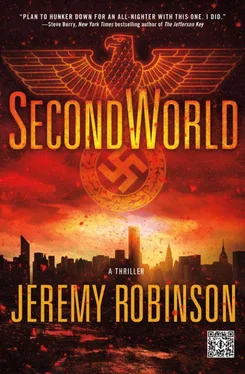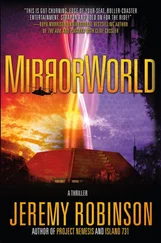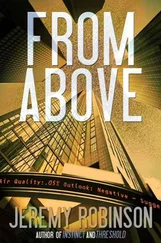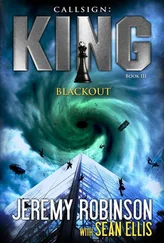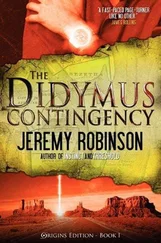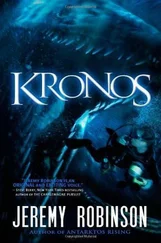Miller knew very little about the vice president, other than the fact that he was an older white man who seemed gentle and kind. But he’d clearly been living a double life.
“Twenty-five members of Congress have disappeared. Over one hundred thousand men and women in the armed forces have gone AWOL. In some parts of the South, entire towns have vanished.”
“They’re going to ground,” Miller said. He was up and pacing now. “How’s this possible?”
“There are a lot of religious groups and cults preparing for the end of the world. It’s possible some of them have been fronts, allowing these neo-Nazis to prepare behind a veil of religious freedom. Hell, the Mormons have been building underground bunkers around the world for years. And either no one bothered to track their construction, or the information has been destroyed, because it’s like they no longer exist. But we know they’re there. Look, the point is, I’m not sure who I can trust anymore, but I know I can trust you. The reason for this conversation is twofold. The first is that I wanted to hear your story firsthand and unfiltered.”
Miller gave a nod. Under the circumstances, his testimony would be unique and potentially beneficial to the ongoing investigation. If he had helpful information, it’s likely the testimony could be altered before it reached those in power, or even altered by those in power. Miller empathized with the president’s paranoia. Who could he trust? “That’s why I was under guard,” Miller realized and said aloud.
Bensson confirmed this with a nod.
“You know he looks very… German, right?”
“I didn’t, but we can replace him if you’d like.”
Miller smiled and shook his head. He couldn’t decide whether the fact that the president took his joke seriously was funny or depressing. “He could have killed me if he wanted to.”
“I doubt that very much,” Bensson said. “I’ve seen your record.”
“That was another life.”
“We’ll see.”
Miller didn’t like the sound of that, but before he could follow that line of thinking, Bensson looked at his watch and said, “I’m running out of time. Every move I make is being scrutinized. If I stay too long it might draw attention.”
Miller caught the hint. Bensson wasn’t worried about himself. He was the president of the United States during the worst act of genocide in the history of the world. Only the president’s death could draw more attention to his office. Bensson was worried his presence would draw attention on Miller.
The story took ten minutes to relay. He told Bensson about the news report he’d seen, the spray-painted symbol, and his encounter with the well-equipped but poorly trained gang. The president didn’t say a word until Miller relayed his encounter with the German sniper.
“You’re sure he was German?”
“Even carried a Karabiner 98k with a mounted scope.”
“What’s a Karabiner?”
“Standard weapon for the Germans in the World War. But sharpshooters used it with a scope.”
“World War Two?”
“Yes, sir. It’s an obsolete weapon. But the way he handled it… he came damn near close to shooting me dead through a windshield while I had the needle pegged. That’s a hard shot with modern sniper rifles, never mind an antique. For whatever reason, the Karabiner was his weapon of choice.” Miller met the president’s eyes. “You don’t think the Germans are part of this?”
“God, I hope not.” Bensson stared at the floor. “But it’s safe to assume that our local neo-Nazis aren’t operating alone.”
“Well, that’s pretty much the end of the story. You know how it ended. It’s not much, but I hope the Nazi angle gives the agencies something new to go on. They can find his body in the trees just after the off-ramp for exit fifty-seven. Maybe he’ll have some more intel.”
“Good thinking,” Bensson said.
Miller sensed the man had something more to say, but felt uncomfortable saying it. “The agencies are on this, right? CIA. FBI. Homeland.”
“NCIS, too,” the president confirmed. “But—”
Everything clicked into place as Miller’s subconscious finally found its voice. This meeting was never about getting the story straight from the horse’s mouth. It was about recruiting the horse. Miller stopped his pacing and turned toward Bensson. “But you don’t trust them.”
“Can’t afford to.”
“But—shit—you trust me.”
“I do. You’ve seen combat. You’re an excellent investigator. You’re the one and only person alive who’s drawn blood on the other side of this thing.”
“And you want me to what, chase down the bad guys?”
“I want you to try.”
Miller began pacing again. “I wouldn’t even know where to begin.”
“No one does.”
“You do realize that I’m in pain from head to toe, that I’ve got stitches in my arm.”
“You’ve been through worse,” the president said. “I would give you the full support of my office. Money. Weapons. Transport. Anything you need to get the job done. Unofficially. Off the record.”
“In case I shoot the wrong person, you mean?”
The president ignored him. “I need a man I can trust.”
Wounded soldiers in the field routinely requested to return to the front line. Sometimes out of loyalty to the men they fought beside. Sometimes out of a sense of duty. And sometimes because of baser desires, like vengeance. But the SEALs were different. Wounded men were distracted, slower, and more likely to make mistakes. Miller wanted to help, but the discipline and self-regulation he learned in the SEALs told him to rest. There had to be someone else. “Sir, you can trust me. But I’m in no shape to—”
The president’s eyes filled with a rage few ever saw in him. He stood face-to-face with Miller. “We might walk out of this room and find red flakes falling from the sky! Millions are dead! Millions! ” Bensson reached into his pocket and withdrew a five-by-seven manila envelope. He handed it to Miller without opening it. He just sat back down and waited.
Miller opened the package and took out a stack of photos. The first was a satellite image. Green land and blue ocean could be seen at the fringe, but a big, dark red splotch filled the center of the image. Miller’s back tensed. “What am I looking at?”
When the president didn’t answer, he flipped to the next image. The red filled the photo. Barely discernable skyscrapers stabbed up through the pink. The next image was closer still, focused on an eight-block radius. He recognized a landmark that was taller than anything else around it. “Tokyo Tower.” He looked at the president. “This is Tokyo.”
“Next image,” Bensson said.
Miller flipped to the next photo. Sun streaked down a long stretch of city street. It looked bumpy, but the long shadows weren’t cast by poor paving. They were bodies. Millions of bodies. Miami had been a horrible sight, but he could navigate through the city. Tokyo was carpeted with dead. Miller sat down, speechless.
“These attacks were focused on the cities,” Bensson said. “Of that, there is no doubt. But they affected the surrounding suburbs as well, which in Tokyo makes the death toll closer to twenty million. Frankly, we got lucky in Miami. It could have been New York or Los Angeles. We also got lucky that there was a southerly wind in Miami that day. Had it shifted north, up the coast, there would have been millions more dead.”
“The wind?”
“We have no idea what kind of science is creating this effect, but once those red flakes appear in the lower atmosphere, they move with the wind, and a pocket of lethal air moves with them. On the northern edge of Miami, the wall of red flakes stayed consistent—on target—but to the south, it got dragged out to sea. That’s how it reached you.”
Читать дальше
